一般疑问句以及肯定句否定句基础练习练习题复习.doc
五年级否定句,一般疑问句,特殊疑问句讲解和练习

五年级否定句,一般疑问句,特殊疑问句讲解和练习研究必备欢迎下载否定句,一般疑问句,特殊疑问句句型转换的方法一、肯定句改否定句的方法——一步法1、在be动词后加not。
如:is not。
are not,am not,was not,were not;2、在can,should,will等后加not。
如:cannot,should not,will not;3、上述都没有的,在动词前加助动词否定形式XXX、some改成any。
把下面的句子变成否定句。
1.She is watching TV now._____________________________________________2.We go to school on Sunday.___________________________________________3.His father works hard._______________________________________________4.X XX'XXX.____________________________________________5.The cat runs fast.____________________________________6.They like XXX.__________________________________7.My grandpa gives me a hot dog._____________________________________8.Tom often walks to school._________________________________________9.I have a doll._______________________________________10.It XXX.______________________________________二、肯定句改一般疑问句的方法——三步法1、把be动词放在句首,剩下的照抄,(some改成any,my改成your等)句点改成问号。
中考初中英语肯定句、否定句、一般疑问句和特殊疑问句的讲解与练习

中考初中英语肯定句、否定句、⼀般疑问句和特殊疑问句的讲解与练习中考初中英语肯定句、否定句、⼀般疑问句和特殊疑问句的讲解与练习肯定句、否定句、⼀般疑问句和特殊疑问句的讲解与练习⼀.句⼦的种类⼀、be动词:am, is, are⼆、肯定句、否定句、⼀般疑问句和特殊疑问句定义1.肯定句:表⽰肯定的意思, 即不含有否定词“不”。
⽐如:我是⼀个学⽣ I am a student.他去上学 He goes to school.2.否定句:表⽰否定的意思。
⽐如:我不是⼀个男孩。
I am not a boy.他不去上学 He does not go to school.3. ⼀般疑问句:回答为“是yes”或者“否no”的问句。
⽐如:你是⼀个学⽣吗? Are you a student?你喜欢英语吗? Do you like English?4. 特殊疑问句:回答不是“是yes”或者“否no”的问句,根据提问内容具体回答。
⽐如:现在⼏点了?What’s the time?哪⼀⽀笔是你的? Which is your pen?三、肯定句、否定句、⼀般疑问句和特殊疑问句的相互转换肯定句变否定句:在am, is, are后⾯加上not,其余按顺序照抄。
肯定句变⼀般疑问句:把am, is, are提前放到句⾸并⼤写Am, Is, Are,其余照抄。
肯定句变特殊疑问句(就划线部分提问):分3步骤第⼀步:先变⼀般疑问句。
第⼆步:找合适的特殊疑问词代替划线部分。
第三步:特殊疑问词提前放到句⾸,并⼤写,其余按顺序照抄,省略划线部分。
注意:1.如:Liming 's not here today. Who's not here today? 今天谁没来?2.划线部分不能在特殊疑问句中出现。
例如:1.肯定句、否定句和⼀般疑问句的互换肯定句:This is a book.否定句:⼀般疑问句:Is this a book?肯定回答:Yes, it is.否定回答:No, it isn’t.2.就划线部分提问(变特殊疑问句)This is a book.第⼀步:变⼀般疑问句 Is this a book?第⼆步:找合适的特殊疑问词 Is this what ?第三步:特殊疑问词提前放到句⾸,并⼤写,其余按顺序照抄,省略划线部分。
中考初中英语肯定句、否定句、一般疑问句和特殊疑问句的讲解与练习.docx

中考初中英语肯定句、否定句、一般疑问句和特殊疑问句的讲解与练习肯定句、否定句、一般疑问句和特殊疑问句的讲解与练习一.句子的种类类别用法标点例句肯定叙述一件事情或This is a bag. That's my book.说明说话人的看法陈述句.I can’ t see a bag over 否定there.I don't know.Are you a student?一般用于提出问题?Do you like puppets?Can you speak English?What's your name?特殊用于提出问题?Where's my bag?疑问句How many trees are there?选择用于提出问题?Is your friend a boy or agirl?反意用于提出问题?It's a fine day, isn't it?祈使句表示命令或请求、建议.Put it here!或! Look at the noticeboard.表示惊讶赞美愤怒How smart!感叹句!Glad to see you!等强烈情感What a nice pencil case!一、 be 动词: am, is, are二、肯定句、否定句、一般疑问句和特殊疑问句定义1.肯定句:表示肯定的意思,即不含有否定词“不”。
比如:我是一个学生I am a student.他去上学He goes to school.2.否定句:表示否定的意思。
比如:我不是一个男孩。
I am not a boy.他不去上学He does not go to school.3.一般疑问句:回答为“是 yes”或者“否 no”的问句。
比如:你是一个学生吗?Are you a student?你喜欢英语吗?Do you like English?4.特殊疑句:回答不是“是yes”或者“否 no”的句,根据提内容具体回答。
一般疑问句和否定句以及全面的配套练习

一般疑问句和否定句以及全面的配套练习一、一般疑问句1. 概念:一般指用Yes 或No 回答的疑问句;2. 特点:一般翻译为“…吗?”,故回答用“是”或“不是”;3. 分类:①含有be 动词的陈述句变为一般疑问句;②含有实意动词的陈述句变为一般疑问句;③含有情态动词的陈述句变为一般疑问句;※4.具体分类学习:①含有be 动词的陈述句变为一般疑问句学习要点1:将be 动词提前;若主语是第一人称,要变为第二人称;其他句子成分位子不变;(your your)学习要点2:回答时的结构如下:Yes,人称代词 + be 动词. No,人称代词 + be not 缩写.其中,回答的人称代词和be 动词要和问句内容相一致;学习要点3:be 动词回答时用到的否定缩写积累:首先:am not 没有缩写, 否定回答缩写为:No, I’m not.其次:is not = isn’t are not = aren’t知识回顾:Be 动词用法口诀:”我”用am, “你”用are, is 连着“他、她、他、它”;单数用“is”,复数用“are”;例句分析:a.Is she a doctor?Yes, she is. / No, she isn’t.b.Are these his dictionaries?Yes, they are. / No, they aren’t.c.随堂练习1: This is her watch. ?. /.总结:当陈述句句子主语是this/that,回答用it 来指代之;当陈述句句子主语是these/those,回答用they 来指代之;随堂练习2:?. /.d.Is she your cousin?Yes, she is. / No, she isn’t.延伸学习:Be 动词的肯定陈述句变为否定陈述句要点:变为否定句,直接在be 动词后面加not;例句分析:Those are not their books.b.He is not my good friend.c.I am not a student.随堂练习:This is my ruler.否定句:.一般疑问句:? Yes,. / No,.小试牛刀:1.She is always a good student.(改为一般疑问句,作否定回答)一般疑问句:?Yes,. / No,.2.Daniel and Tommy(be) in Class One.3.There(be) some water in the bottle.4.I(be) ill. I’m staying in bed.5.What day(be) it today? It’s Saturday.②含有实意动词的陈述句变为一般疑问句;学习要点1:找助动词do / does 构成疑问和否定;学习要点2: 一般疑问句也要找do/does,放句首构成疑问;例句分析1:I have an apple. : 我有一个苹果。
肯定句、否定句、一般疑问句和特殊疑问句的讲解与练习
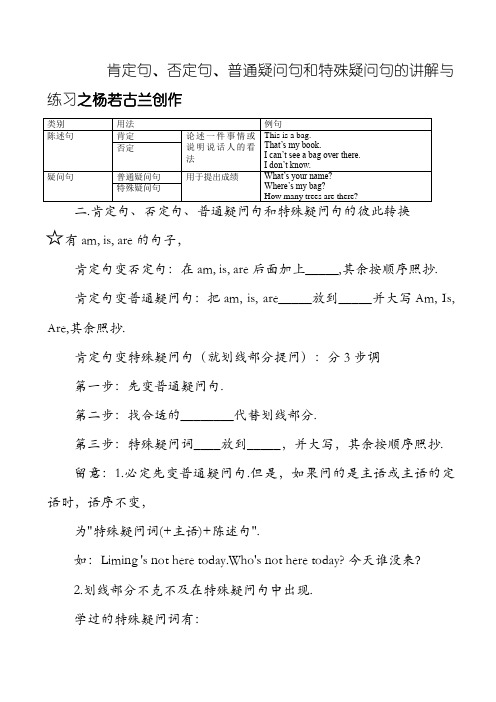
肯定句、否定句、普通疑问句和特殊疑问句的讲解与练习之杨若古兰创作有am, is, are的句子,肯定句变否定句:在am, is, are后面加上_____,其余按顺序照抄.肯定句变普通疑问句:把am, is, are_____放到_____并大写Am, Is, Are,其余照抄.肯定句变特殊疑问句(就划线部分提问):分3步调第一步:先变普通疑问句.第二步:找合适的________代替划线部分.第三步:特殊疑问词____放到_____,并大写,其余按顺序照抄.留意:1.必定先变普通疑问句.但是,如果问的是主语或主语的定语时,语序不变,为"特殊疑问词(+主语)+陈述句".如:Liming 's not here today.Who's not here today? 今天谁没来?2.划线部分不克不及在特殊疑问句中出现.学过的特殊疑问词有:when, who,why, where, what, what time, what color, what day, what date, how, how old, how many, how much等等★★语法专练★★一、填入所缺的疑问词1.--_______do you like summer? -- Because I can swim.2.--is the post office? -- It’s next to the cinema.3.--______can I get to Zhong Shan Park?--By underground.4--.______ _______ are you? -- I’m 14 years old5.--______ ______ is it? --It’s Monday.6.--_____ _____ does it take to your school. --About ten minutes.7.-- _______is your skirt,Amy? --It’s 100 yuan.8.--____ is today? --It’s February, fifth.1. There are 50 students in our class.否定句:______________________________________________普通疑问句:_______________________________________特殊疑问句:_______________________________________2. It takes Mike thirty minutes to go to school.普通疑问句:___________________________________________ ________否定句:_______________________________________________ __________3. I usually play football on Friday afternoon.否定句:__________________________________________________ ________普通疑问句:______________________________________ ________________就划线部分提问__________________________ _________________________4. The book costs Mary ten yuan. 否定句:________________________ ________________________________ 普通疑问句:______________ ________________________________________ 划线提问:________ ________________________________________________5.Today is Febru ary 5th, Tuesday. 否定句:_____________________________________ _____________________ 普通疑问句:_________________________ _____________________________ 划线提问____________________ _____________________________________6. Tom does his homework at home. 否定句:___________________________________________ _______________ 普通疑问句:_______________________________ _______________________ 划线提问__________________________ _______________________________7. Angela goes to school by subway.否定句:__________________________________________________ ________ 普通疑问句:______________________________________ ________________ 划线提问_________________________________ ________________________( )1.How many story books do you have ?A.I have 10.B.I can see 10.C.Thirtyyuan.( )2.Do you have new teachers?A.Yes,we do .B.Yes,we don’t.C.Yes,we have .( )3.Who’s your art teacher ?A.Mr Zhu.B.Miss Zhu.C.He’s tall.( )4.What’s he like?A.He’s tall and strong .B.Yes,he is.C.Mr Zhu.( )5.Is your English teacher young?A.No,she isn’t.B.Yes,she is .C.No,she is.( )6. ? Her name is Chen Jie.A.What’s your name ?B.What’s she name ?C.What’s her name ?( )7. ? I like Chinese,math and English.A.What classes do you like?B.Whatdo you like?C.What are you like ?( )8. ? It’s Monday.A.What is it today ?B.What day is it today ?C.What day is today ?( ) 9. ______? It’s eight.A. What day is itB. What’s five and threeC. How old are youD. What’s your telephone number( ) 10. ______ is a ticker for the film Hacker He?-About forty yuan .A. How oldB. How manyC.How muchD. How often( )11. How are you ?A.Fine,thanks.B.Yes,it is.C.How are you ?( )12. How do you go to school ?A.I go to Canada by plane.B.I go to school by bike.C.What about you ?( )13. How do you go to the USA ?A.I usually go to school by bus.B.I go to England by ship.C.I go by plane.Part B综合练习Linda is an English girl.She is twelve years old.She has two brothers.1 are Jack and Jim. But she doesn’t 2 any sisters.Linda goes to school by 3. She usually 4to school at eight o’clock. The firstclass 5starts at nine o’clock.She has five classes every day. Her favorite 6are math and science. She hasmathfromMonday7Friday.On weekends, she 8 her brother with his homework at home. Sometimes she listens to music.She likes 9 very much. Her favorite musician is Liu Huan from China.She thinks his songs are very 10 .She likes them very much.( )1.A. We B. You C.They( )2.A. have B. know C. find( )3.A. radio B. bus C. watch( )4.A. leaves B. takes C. gets( ) 5.A. book B. class C. picture( )6.A.subjects B. clothes C. colors( ) 7.A. ofB.at C. to( )8. A.asks B says C helps( )9. A.dancing B.singing C. running( )10. A.relaxing B. boring C. difficult二.完成对话A: Hi, John.B: Hello, Kate, ___1___ is that girl over there?A: You mean the girl ___2___ red? She is my new classmate , Anne.B: Is she from England?A: No. She is from America. She is an ___3___.B: Why does she come ___4___ China?A: Her parents are working in China now.B: You mean the two foreign___5___ in our school?A: Yeah. She is ___6___ daughter.B: Does she ___7___ English?A: Of course.B: Maybe you can ___8___ her to help you ___9___ your English.A: How about her ____10____.B: She can only speak a little Chinese. So we can help each other.A: That sounds a good idea.What means of transportation(交通工具) do you like?AlanI find it’s hard to answer this question. I fear (害怕) any kind of transportation, so it’s hard to choose (选择). If I have to, I’d choose the plane . 1 Becky I don’t like taking trains. There are always problems with trains. They’re often late. So I never take a train. 2Sally3 Because I like traveling (旅行) by bicycle, by plane, by boat, by car ... But I like walking best. I enjoy walking.BobMy favorite way of traveling is my computer mouse (鼠标). 4 I can go around the world in a few minutes. 5A.I use my car and always get to the place that I want to go quickly.B.It is the fastest means of transportation.C.I can speak to people from all over the world, and look up (查阅) things quickly too.D.Answering this question is very difficult.E.It’s quick, relaxing, and we can get food anddrink on the it.Part 3 listeningA.听句子(共5小题,每小题1分,共5分)根据所听句子的内容和所提的成绩,选择符合题意的图片回答成绩,并将答案写在题前的括号内.每小题听一遍.( )1.How does Dave go to school?A B C( )2.Where does Mr. Smith work?A B C( )3.What can Sam do?A B C( )4.What is the rule in their school?A B C( )5.Where does Mrs. Green want to go?A B CB. 听对话(共10小题,每小题1分,共10分)根据所听对话的内容和所提的成绩,在各小题所给的三个选项当选出一个最好选项,并将答案写在题前的括号内.每段对话听两遍.听第一段对话,回答第6小题.( )6.How far does Jeff live from Big Library?A.Eight kilometers.B.Ten kilometers.C.Eleven kilometers.听第二段对话,回答第7小题.( )7.How does Linda go to school?A.On foot.B.By subway.C.By bus.听第三段对话,回答第8小题.( )8.Where is Jack’s friend from?A.Canada.B.America.C.Japan.听第四段对话,回答第9小题.( )9.Where does Katrina’s mother often go on Sunday?A.Center Zoo.B.City Park.C.Green Beach.听第五段对话,回答第10小题.( )10.What will Jim do?A.He will put on his shirt.B.He will put away his shirt.C.He will take off his shirt.听第六段对话,回答第11~12小题.( )11.Where may (可能) the two people be?A.In a cinema.B.In a park.C.In a library.( )12.Can they eat there?A.Yes,they can.B.No,th ey can’t.C.Wedon’t know.听第七段对话,回答第13~15小题.( )13.What day is it tomorrow?A.Friday.B.Thursday.C.Saturday.( )14.Why does the girl want to buy a present for her brother?A.Because he gets a good mark.B.Because her mother asks her to do so.C.Because his birthday is coming.( )15.What does the girl’s brother like doing?A.Drawing.B.Reading.C.Swimming.C. 听短文(共5小题,每小题1分,共5分)根据所听短文的内容,在各小题所给的三个选项当选出一个能完成句子的最好选项,并将答案写在题前的括号内.短文听两遍.( )16.Tomorrow is ________.A.SundayB.Tuesday C.Saturday( )17.In the morning, Bill ________.A.helps his mother clean the houseB.does his homeworkC.studies for his math test( )18.In the afternoon, they go to the library ________.A.by busB.by bikeC.on foot( )19.It takes them ________ minutes to get to the library.( )20.They go home at about ________.A. 5:00 p.m.B. 6:00 p.m.C. 7:00 p.m.HomeworkIt’s well known that (尽人皆知) the English always go out with an umbrella(雨伞) or a raincoat(雨衣). Why ? 1 the weather in Britain(英国) often changes(改变) quickly. The sun 2 brightly(残暴地)in the morning, but later it may rain. After a while it gets 3 again. You’d better 4 an umbrella when you go out.In England, spring can be windy(有风的) and rainy(下雨的). Many trees and flowers 5 .Summer is hot and it rains 6 . It is the 7 time to go to the seaside (海边) and other interesting places. Autumn is a beautiful season. It’s 8.in the woods ( 树林), fields (田野)and parks. Winter comes after 9 . It often snows. January and February are the coldest 10 of the year.( ) 1. A. If B. As C.For D. Because( ) 2. A. shines B. arrives C. comes D. goes( ) 3. A. rainy B. good C. fine D. well( ) 4. A. take B. buy C. bring D. return( ) 5. A. come back to life B. turned greenC. turn yellowD. fall from the trees( ) 6. A. a lot of B. lots of C. lots D. a lot( ) 7. A. best B. bad C. good D. well( ) 8. A. bright B. green C. white D. yellow( ) 9. A. summer B. fall C. spring D. snow( ) 10. A. month B. months C. spring D. seasonsMy name is Wang Wei.Iam a Chinese boy. I am fourteen years old now. I am a middle school student.We have many rules(规定) in our school. we have to get up at 6:00 in the morning. After getting up, we have to run on the playground(操场). Then we have to do some reading. we read English, Chinese, history and so on. We can’t be late for class. We can’t fight and eat in the classrooms. We can’t listen to music or run in the hallways. We have lunch in the dining hall at school. We should(应当) be quiet when we eat lunch. We go home at five inthe afternoon. After we get home, we have to do too much homework. If we don’t finish(完成) our homework, we can’t watch TV or play computer games. We have to go to bed before 1o: 00 at night.( )1. When does Wang Wei have to at six in the morning.A. do his homeworkB. have dinnerC. get upD. go to bed( )2. Wang Wei has to come to his classroom .A. lateB. on timeC. lazilyD. Noisily( )3. Wang Wei has homework to do every schoolday.A. a littleB. littleC. a lot ofD. No( )4.Where do the students in his school eat lunch?A. At school.B. At home.C. In the library.D. In the classroom.( )5. Both the teachers and the parents are the students like Wang Wei.A. sorry forB. easy toC. kind toD. strict with。
英语肯定句、否定句、一般疑问句和特殊疑问句的讲解与练习

英语肯定句、否定句、一般疑问句和特殊疑问句的讲解与练习肯定句、否定句、一般疑问句和特殊疑问句的讲解与练习一.句子的种类类别用法标点例句陈述句肯定叙述一件事情或说明说话人的看法.This is a bag.That's my book. 否定I can’t see abag over there.I don't know.疑问句一般用于提出问题?Are you astudent?Do you likepuppets?Can you speakEnglish?特殊用于提出问题?What's yourname?Where's my bag? How many trees are there?用于提出问题?选择Is your friend a boy or a girl?反意用于提出问题?It's a fine day, isn't it?祈使句表示命令或请求、建议.或!Put it here!Look at thenoticeboard.感叹句表示惊讶\赞美\愤怒等强烈情感!H ow smart!Glad to see you!What a nicepencil case!一、be动词:am, is, are二、肯定句、否定句、一般疑问句和特殊疑问句定义1.肯定句:表示肯定的意思, 即不含有否定词“不”。
比如:我是一个学生 I am a student.他去上学 He goes to school.2.否定句:表示否定的意思。
比如:我不是一个男孩。
I am not a boy.他不去上学 He does not go to school.3. 一般疑问句:回答为“是yes”或者“否no”的问句。
比如:你是一个学生吗? Are you a student?你喜欢英语吗? Do you like English?4. 特殊疑问句:回答不是“是yes”或者“否no”的问句,根据提问内容具体回答。
(完整版)英语肯定句、否定句、一般疑问句和特殊疑问句地讲解与练习
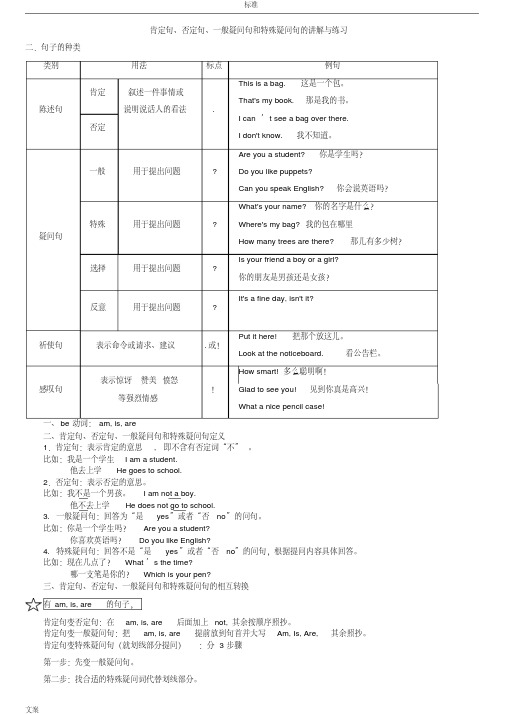
肯定句、否定句、一般疑问句和特殊疑问句的讲解与练习二.句子的种类类别用法标点例句陈述句肯定叙述一件事情或说明说话人的看法.This is a bag.这是一个包。
That's my book.那是我的书。
否定I can’t see a bag over there.I don't know.我不知道。
疑问句一般用于提出问题?Are you a student?你是学生吗?Do you like puppets?Can you speak English?你会说英语吗?特殊用于提出问题?What's your name?你的名字是什么?Where's my bag?我的包在哪里How many trees are there?那儿有多少树?选择用于提出问题?Is your friend a boy or a girl?你的朋友是男孩还是女孩?反意用于提出问题?It's a fine day, isn't it?祈使句表示命令或请求、建议.或!Put it here!把那个放这儿。
Look at the noticeboard.看公告栏。
感叹句表示惊讶赞美愤怒等强烈情感!How smart!多么聪明啊!Glad to see you!见到你真是高兴!What a nice pencil case!一、be动词:am, is, are二、肯定句、否定句、一般疑问句和特殊疑问句定义1.肯定句:表示肯定的意思, 即不含有否定词“不”。
比如:我是一个学生 I am a student.他去上学 He goes to school.2.否定句:表示否定的意思。
比如:我不是一个男孩。
I am not a boy.他不去上学 He does not go to school.3. 一般疑问句:回答为“是yes”或者“否no”的问句。
比如:你是一个学生吗? Are you a student?你喜欢英语吗? Do you like English?4. 特殊疑问句:回答不是“是yes”或者“否no”的问句,根据提问内容具体回答。
肯定句、否定句_一般疑问句
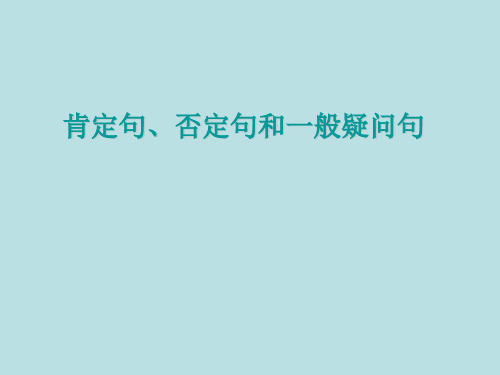
第一步:找
找 be动词、have、has、
如
找到了
情态动词
没找到
何 改
第二步:提
加 do
一
提句首(大写)
does
般
疑
第三步:改
问
①“句号”改“问号”
句
②如果有第一、第二
?
人称,则互改。
第四步:抄
其他照抄 一字不漏
肯定句、 否定句
和一般疑问句
基本概念
肯定句和否定句之间的转换 肯定句和一般疑问句之间的转换
肯定句和否定句之间的转换
1. 如果肯定句中有be动词(am, is, are, was, were)、助动词have、has, 或 情态动词(can, could, must,will 等) 直接+not即可得到相应的否定句。
Exercise
• My father is a taxi driver. → My father is not (isn’t) a taxi driver.
6. I wrote a letter to my uncle the day before yesterday. _____________________________________________
答案:Did you write a letter to my uncle the day before yesterday?
首页 上页 下页
• 3. There are many supermarkets in the city. _____ ____ _____supermarkets in the city?
答案:Are there many supermarkets in the city?
肯定句变否定句和一般疑问句类型习题(整理了答案).
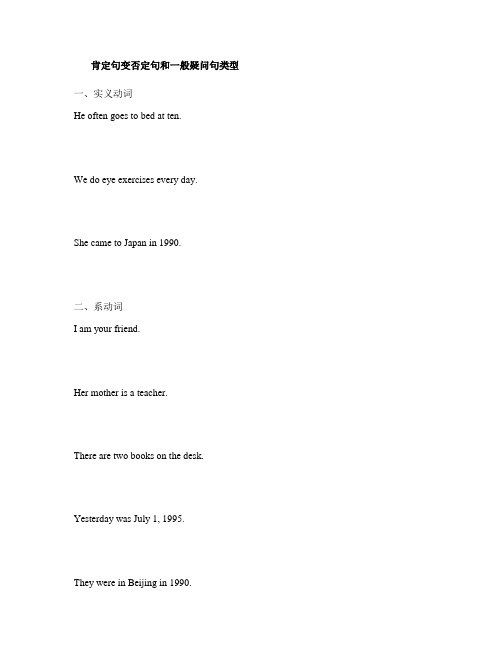
肯定句变否定句和一般疑问句类型一、实义动词He often goes to bed at ten._________________________________________ _________________________________________ We do eye exercises every day._________________________________________ _________________________________________ She came to Japan in 1990._________________________________________ _________________________________________二、系动词I am your friend._________________________________________ _________________________________________ Her mother is a teacher._________________________________________ _________________________________________ There are two books on the desk._________________________________________ _________________________________________ Yesterday was July 1, 1995._________________________________________ _________________________________________ They were in Beijing in 1990.__________________________________________________________________________________三、进行时The girl is standing at the station.__________________________________________________________________________________The students are playing basketball on the playground. __________________________________________________________________________________I am looking for a job recently.__________________________________________________________________________________He was writing letters at this time last night.__________________________________________________________________________________We were having a meeting this time yesterday.__________________________________________________________________________________四、被动语态The man was run over by a car.__________________________________________________________________________________The plan has been made.__________________________________________________________________________________Kate may be elected our monitor._________________________________________ _________________________________________ 五、助动词He has been to England twice._________________________________________ _________________________________________ We have stayed here for six years._________________________________________ _________________________________________ Tom had finished the task before nine o’clock._________________________________________ _________________________________________ 六、情态动词Lucy will be back in four days._________________________________________ _________________________________________ You can use this dictionary._________________________________________ _________________________________________ You need go tomorrow._________________________________________ _________________________________________ We ought to answer this question now?_________________________________________Little Jane dared go alone._________________________________________ _________________________________________ 将下列陈述句变为否定句和一般疑问句。
肯定句变否定句和一般疑问句类型_习题(整理了答案)

肯定句变否定句和一般疑问句类型一、实义动词He often goes to bed at ten._________________________________________ _________________________________________ We do eye exercises every day._________________________________________ _________________________________________ She came to Japan in 1990._________________________________________ _________________________________________二、系动词I am your friend._________________________________________ _________________________________________ Her mother is a teacher._________________________________________ _________________________________________ There are two books on the desk._________________________________________ _________________________________________ Yesterday was July 1, 1995._________________________________________ _________________________________________ They were in Beijing in 1990._________________________________________ _________________________________________ 三、进行时The girl is standing at the station._________________________________________ _________________________________________ The students are playing basketball on the playground._________________________________________ _________________________________________ I am looking for a job recently._________________________________________ _________________________________________ He was writing letters at this time last night._________________________________________ _________________________________________ We were having a meeting this time yesterday._________________________________________ _________________________________________ 五、助动词He has been to England twice._________________________________________ _________________________________________ We have stayed here for six years._________________________________________ _________________________________________ Tom had finished the task before nine o’clock._________________________________________ _________________________________________ 将下列陈述句变为否定句和一般疑问句。
小学英语肯否一特四种句型详解及精编练习题精排版!!!
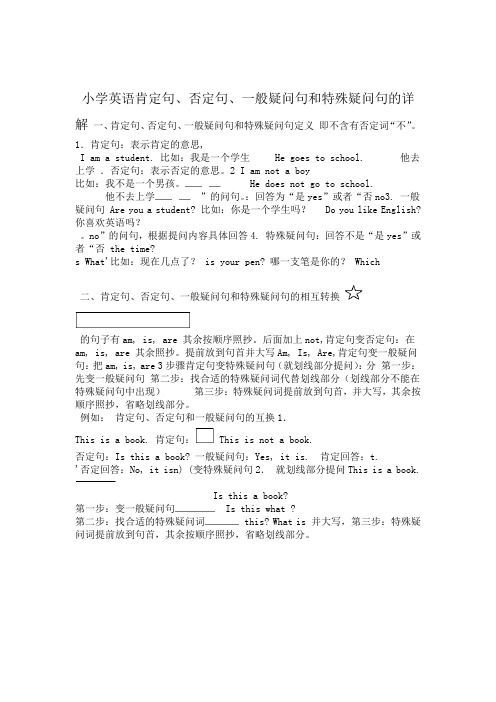
小学英语肯定句、否定句、一般疑问句和特殊疑问句的详解一、肯定句、否定句、一般疑问句和特殊疑问句定义即不含有否定词“不”。
1.肯定句:表示肯定的意思,I am a student. 比如:我是一个学生 He goes to school. 他去上学.否定句:表示否定的意思。
2 I am not a boy比如:我不是一个男孩。
He does not go to school.他不去上学”的问句。
:回答为“是yes”或者“否no3. 一般疑问句 Are you a student? 比如:你是一个学生吗? Do you like English? 你喜欢英语吗?。
no”的问句,根据提问内容具体回答4. 特殊疑问句:回答不是“是yes”或者“否 the time?s What'比如:现在几点了? is your pen? 哪一支笔是你的? Which 二、肯定句、否定句、一般疑问句和特殊疑问句的相互转换的句子有am, is, are 其余按顺序照抄。
后面加上not,肯定句变否定句:在am, is, are 其余照抄。
提前放到句首并大写Am, Is, Are,肯定句变一般疑问句:把am, is, are 3步骤肯定句变特殊疑问句(就划线部分提问):分第一步:先变一般疑问句第二步:找合适的特殊疑问词代替划线部分(划线部分不能在特殊疑问句中出现)第三步:特殊疑问词提前放到句首,并大写,其余按顺序照抄,省略划线部分。
例如:肯定句、否定句和一般疑问句的互换1.This is a book. 肯定句:This is not a book.否定句:Is this a book? 一般疑问句:Yes, it is. 肯定回答:t.'否定回答:No, it isn) (变特殊疑问句2.就划线部分提问This is a book.Is this a book?第一步:变一般疑问句 Is this what ?第二步:找合适的特殊疑问词this? What is 并大写,第三步:特殊疑问词提前放到句首,其余按顺序照抄,省略划线部分。
(完整版)英语肯定句、否定句、一般疑问句和特殊疑问句地讲解与练习
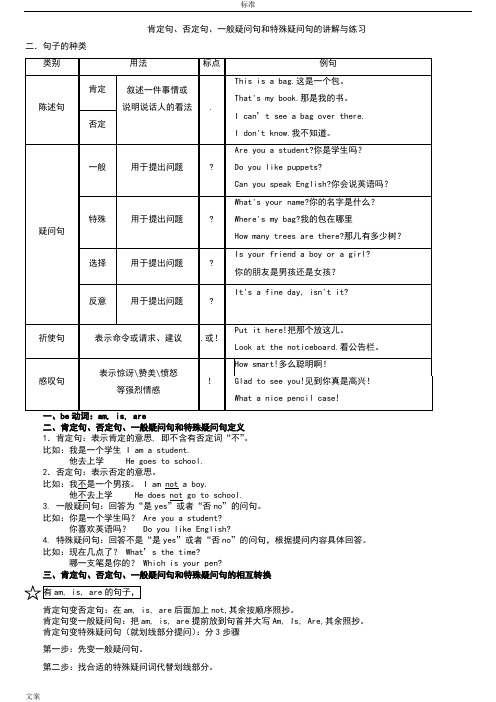
肯定句、否定句、一般疑问句和特殊疑问句的讲解与练习二.句子的种类二、肯定句、否定句、一般疑问句和特殊疑问句定义1.肯定句:表示肯定的意思, 即不含有否定词“不”。
比如:我是一个学生 I am a student.他去上学 He goes to school.2.否定句:表示否定的意思。
比如:我不是一个男孩。
I am not a boy.他不去上学 He does not go to school.3. 一般疑问句:回答为“是yes ”或者“否no ”的问句。
比如:你是一个学生吗? Are you a student?你喜欢英语吗? Do you like English?4. 特殊疑问句:回答不是“是yes ”或者“否no ”的问句,根据提问内容具体回答。
比如:现在几点了? What ’s the time?哪一支笔是你的? Which is your pen?三、肯定句、否定句、一般疑问句和特殊疑问句的相互转换肯定句变否定句:在am, is, are 后面加上not,其余按顺序照抄。
肯定句变一般疑问句:把am, is, are 提前放到句首并大写Am, Is, Are,其余照抄。
肯定句变特殊疑问句(就划线部分提问):分3步骤第一步:先变一般疑问句。
第二步:找合适的特殊疑问词代替划线部分。
第三步:特殊疑问词提前放到句首,并大写,其余按顺序照抄,省略划线部分。
注意:1.如:Liming 's not here today. Who's not here today? 今天谁没来?2.划线部分不能在特殊疑问句中出现。
1.肯定句、否定句和一般疑问句的互换肯定句:否定句:一般疑问句:肯定回答:Yes, it is.否定回答:No, it isn’t.2.就划线部分提问(变特殊疑问句)This is a book.第一步:变一般疑问句 Is this a book?第二步:找合适的特殊疑问词 Is this what ?What is this?do not或者does not,其余按顺序照抄动词用原形。
中考初中英语肯定句、否定句、一般疑问句和特殊疑问句的讲解与练习

中考初中英语肯定句、否定句、一般疑问句和特殊疑问句的讲解与练习肯定句、否定句、一般疑问句和特殊疑问句的讲解与练习一.句子的种类一、be动词:am, is, are二、肯定句、否定句、一般疑问句和特殊疑问句定义1.肯定句:表示肯定的意思, 即不含有否定词“不”。
比如:我是一个学生 I am a student.他去上学 He goes to school.2.否定句:表示否定的意思。
比如:我不是一个男孩。
I am not a boy.他不去上学 He does not go to school.3. 一般疑问句:回答为“是yes”或者“否no”的问句。
比如:你是一个学生吗? Are you a student?你喜欢英语吗? Do you like English?4. 特殊疑问句:回答不是“是yes”或者“否no”的问句,根据提问内容具体回答。
比如:现在几点了?What’s the time?哪一支笔是你的? Which is your pen?三、肯定句、否定句、一般疑问句和特殊疑问句的相互转换肯定句变否定句:在am, is, are后面加上not,其余按顺序照抄。
肯定句变一般疑问句:把am, is, are提前放到句首并大写Am, Is, Are,其余照抄。
肯定句变特殊疑问句(就划线部分提问):分3步骤第一步:先变一般疑问句。
第二步:找合适的特殊疑问词代替划线部分。
第三步:特殊疑问词提前放到句首,并大写,其余按顺序照抄,省略划线部分。
注意:1.如:Liming 's not here today. Who's not here today? 今天谁没来?2.划线部分不能在特殊疑问句中出现。
例如:1.肯定句、否定句和一般疑问句的互换肯定句:This is a book.否定句:一般疑问句:Is this a book?肯定回答:Yes, it is.否定回答:No, it isn’t.2.就划线部分提问(变特殊疑问句)This is a book.第一步:变一般疑问句 Is this a book?第二步:找合适的特殊疑问词 Is this what ?第三步:特殊疑问词提前放到句首,并大写,其余按顺序照抄,省略划线部分。
一般疑问句和否定句讲解和练习题
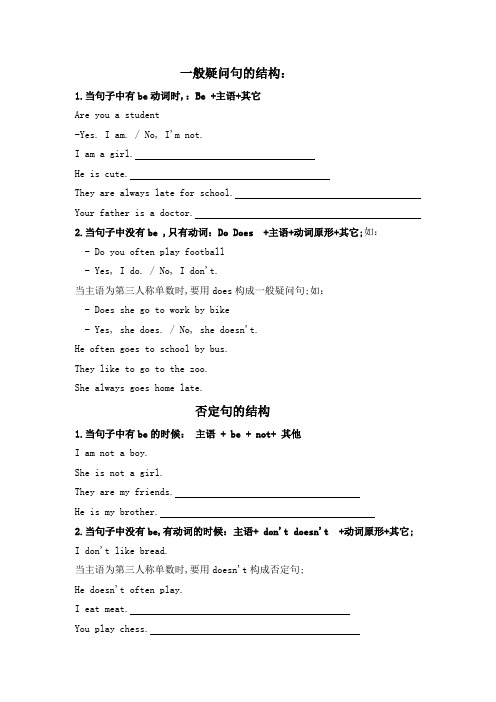
一般疑问句的结构:1.当句子中有be动词时,:Be +主语+其它Are you a student-Yes. I am. / No, I'm not.I am a girl.He is cute.They are always late for school. Your father is a doctor.2.当句子中没有be ,只有动词:Do Does +主语+动词原形+其它;如:- Do you often play football- Yes, I do. / No, I don't.当主语为第三人称单数时,要用does构成一般疑问句;如:- Does she go to work by bike- Yes, she does. / No, she doesn't.He often goes to school by bus.They like to go to the zoo.She always goes home late.否定句的结构1.当句子中有be的时候:主语 + be + not+ 其他I am not a boy.She is not a girl.They are my friends.He is my brother.2.当句子中没有be,有动词的时候:主语+ don't doesn't +动词原形+其它;I don't like bread.当主语为第三人称单数时,要用doesn't构成否定句;He doesn't often play.I eat meat.You play chess.She always does the housework on Sunday.The dog plays with its tail all the day.一、用所给动词的一般现在时填空;1. We often play in the playgrounnd.2 you brush your teeth every morning3. What do he usually do after school4. Danny study English, Chinese, Maths, Science, and Art an school.5. Mike sometimes go to the park with his sister.6. At eight at night, she watch TV with his family.7. Mike read English every day8. How many lessons your classmate have on Monday9. What time his mother do the housework二、按要求改写句子;1Do you often play football after school 改为肯定句2I have some books. 改为否定句3Gao Shan’s sister likes playing table tennis. 改为否定句4She lives in a small town near New York. 改为一般疑问句5I watch TV every day. 改为一般疑问句6We have four lessons. 改为否定句7Nancy doesn’t run fast. 改为肯定句三、单项选择;1. you have a bookA. DoB. AreC. IsD. Have2. They on a farm.A. workingB. is workC. workD. is worked3. Does Peter like to watch TV .A. Yes, he likeB. No, he doesn’tC. Yes, he’d likeD. No, he likes4. She doesn’t her homework in the afternoon.A. doingB. to doC. doesD. do5. Where’s my camera I it.A.am not findingB. am not seeingC. can’t findD. can’t lookat6. you usually late for school No, .A. Do, I amB. Does, notC. Are, I’m notD. Are, I aren’t7. she home at six every dayA. Is, leaveB. Does, leaveC. Is, leavesD. Does, left8. Mr. Yang English this term.A. teaches ourB. teaches usC. teachs usD. teach ourI have 3 new teachers. They are my English teacher, my teacher and my Chinese teacher. Miss zhao is pretty and active. She's a universitystudent. She's our English teacher. My teacher is Mr. Chen. He's tall and strong, and he's strict, too. Miss Sun is my Chinese teacher. She's quiet. She has long hair and big eyes.1. I have new teachers. A. twoB. threeC. four2. Miss Zhao is myteacher. A. EnglishB. ChineseC. PE3. Mr. Chen is . A. tall B. strong C. tall and strong4. Is my teacher strictA. Yes, she is B. Yes, he is C. No, he isn't5. Miss Sun is . A. quiet B. active C. strict。
英语肯定句、否定句、一般疑问句和特殊疑问句的讲解与练习
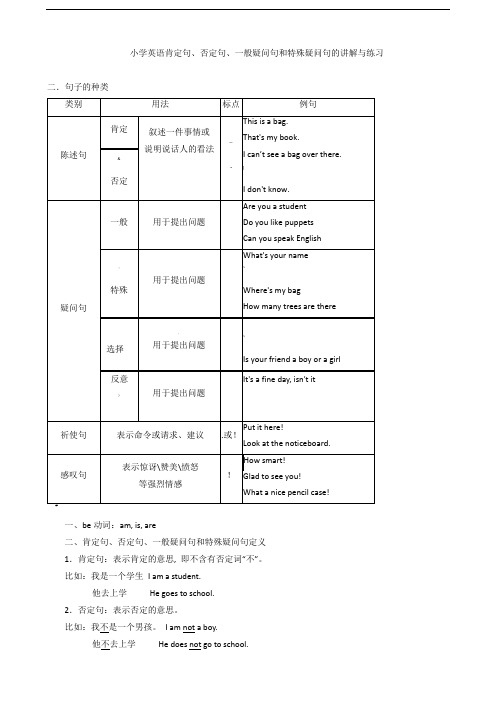
小学英语肯定句、否定句、一般疑问句和特殊疑问句的讲解与练习二.句子的种类一、be动词:am, is, are二、肯定句、否定句、一般疑问句和特殊疑问句定义1.肯定句:表示肯定的意思, 即不含有否定词“不”。
比如:我是一个学生I am a student.他去上学He goes to school.2.否定句:表示否定的意思。
比如:我不是一个男孩。
I am not a boy.3. 一般疑问句:回答为“是yes”或者“否no”的问句。
(比如:你是一个学生吗Are you a student你喜欢英语吗Do you like English4. 特殊疑问句:回答不是“是yes”或者“否no”的问句,根据提问内容具体回答。
比如:现在几点了W hat’s the time哪一支笔是你的Which is your pen三、肯定句、否定句、一般疑问句和特殊疑问句的相互转换肯定句变否定句:在am, is, are后面加上not,其余按顺序照抄。
肯定句变一般疑问句:把am, is, are提前放到句首并大写Am, Is, Are,其余照抄。
肯定句变特殊疑问句(就划线部分提问):分3步骤。
第一步:先变一般疑问句。
第二步:找合适的特殊疑问词代替划线部分。
第三步:特殊疑问词提前放到句首,并大写,其余按顺序照抄,省略划线部分。
注意:1.如:Liming 's not here today.Who's not here today 今天谁没来2.划线部分不能在特殊疑问句中出现。
|例如:1.肯定句、否定句和一般疑问句的互换肯定句:This is a book.否定句:一般疑问句:Is this a book肯定回答:Yes, it is.否定回答:No, it isn’t.2.就划线部分提问(变特殊疑问句)This is a book.第一步:变一般疑问句Is this a book—第二步:找合适的特殊疑问词Is this what第三步:特殊疑问词提前放到句首,并大写,其余按顺序照抄,省略划线部分。
英语肯定句、否定句、一般疑问句和特殊疑问句的讲解与练习

英语肯定句、否定句、一般疑问句和特殊疑问句的讲解与练习肯定句、否定句、一般疑问句和特殊疑问句的讲解与练习二.句子的种类类别用法标点例句陈述句肯定叙述一件事情或说明说话人的看法.This is a bag.这是一个包。
That's my book.那是我的书。
否定I can’t see a bag overthere.I don't know.我不知道。
疑问句一般用于提出问题?Are you a student?你是学生吗?Do you like puppets?Can you speak English?你会说英语吗?特殊用于提出问题?What's your name?你的名字是什么?Where's my bag?我的包在哪里How many trees are there?那儿有多少树?选择用于提出问题?Is your friend a boy or agirl?你的朋友是男孩还是女孩?反意用于提出问题?It's a fine day, isn'tit?祈使句表示命令或请求、建议.或!Put it here!把那个放这儿。
Look at the noticeboard.看公告栏。
感叹句表示惊讶\赞美\愤怒等强烈情感!How smart!多么聪明啊!Glad to see you!见到你真是高兴!What a nice pencil case!一、be动词:am, is, are二、肯定句、否定句、一般疑问句和特殊疑问句定义1.肯定句:表示肯定的意思, 即不含有否定词“不”。
比如:我是一个学生 I am a student.他去上学 He goes to school.2.否定句:表示否定的意思。
比如:我不是一个男孩。
I am not a boy.他不去上学 He does not go to school.3. 一般疑问句:回答为“是yes”或者“否no”的问句。
英语肯定句、否定句、一般疑问句和特殊疑问句的讲解与练习
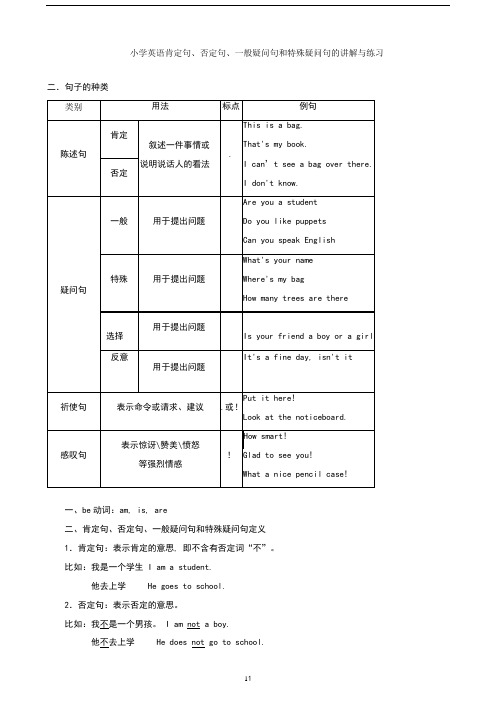
小学英语肯定句、否定句、一般疑问句和特殊疑问句的讲解与练习二.句子的种类一、be动词:am, is, are二、肯定句、否定句、一般疑问句和特殊疑问句定义1.肯定句:表示肯定的意思, 即不含有否定词“不”。
比如:我是一个学生 I am a student.他去上学 He goes to school.2.否定句:表示否定的意思。
比如:我不是一个男孩。
I am not a boy.他不去上学 He does not go to school.3. 一般疑问句:回答为“是yes”或者“否no”的问句。
比如:你是一个学生吗 Are you a student你喜欢英语吗 Do you like English4. 特殊疑问句:回答不是“是yes”或者“否no”的问句,根据提问内容具体回答。
比如:现在几点了What’s the time哪一支笔是你的 Which is your pen三、肯定句、否定句、一般疑问句和特殊疑问句的相互转换肯定句变否定句:在am, is, are后面加上not,其余按顺序照抄。
肯定句变一般疑问句:把am, is, are提前放到句首并大写Am, Is, Are,其余照抄。
肯定句变特殊疑问句(就划线部分提问):分3步骤第一步:先变一般疑问句。
第二步:找合适的特殊疑问词代替划线部分。
第三步:特殊疑问词提前放到句首,并大写,其余按顺序照抄,省略划线部分。
注意:1.如:Liming 's not here today. Who's not here today 今天谁没来2.划线部分不能在特殊疑问句中出现。
例如:1.肯定句、否定句和一般疑问句的互换肯定句:This is a book.否定句:一般疑问句:Is this a book肯定回答:Yes, it is.否定回答:No, it isn’t.2.就划线部分提问(变特殊疑问句)This is a book.第一步:变一般疑问句 Is this a book第二步:找合适的特殊疑问词 Is this what第三步:特殊疑问词提前放到句首,并大写,其余按顺序照抄,省略划线部分。
- 1、下载文档前请自行甄别文档内容的完整性,平台不提供额外的编辑、内容补充、找答案等附加服务。
- 2、"仅部分预览"的文档,不可在线预览部分如存在完整性等问题,可反馈申请退款(可完整预览的文档不适用该条件!)。
- 3、如文档侵犯您的权益,请联系客服反馈,我们会尽快为您处理(人工客服工作时间:9:00-18:30)。
精品文档
一般疑问句以及肯定句否定句练习题
一、一般疑问句:特点:是以问号“?”结尾的
步骤:1、找出be动词(am, is , are)
2、be动词提前,放在句子开头,注意要改写成大写
3、其余部分照抄,但遇到my要改成your, I 要改成you
(注意:you 只能跟are连)
一般疑问句的回答:分为两种,肯定回答和否定回答
肯定回答:Yes, it/she/he is. 或者Yes, I am.(视具体情况而定)
否定回答:No, it/she/he is not. 或者No, I am not.(视具体情况而定)练习题:将下列句子改成一般疑问句并进行回答。
1、This is a pen.(否定回答)
2、This is my ruler.(否定回答)
3、She is Yang Ling.(否定回答)
4、It is an apple.(肯定回答)
5、I am Mike.(肯定回答)
二、否定句,是以句号“。
”结尾的
步骤1、找出句子中的be(am ,is ,are)动词
2、在be动词后+“not”,其余照抄
否定句改为肯定句,只要将be动词后的”not”去掉练习题:将下列句子改成否定句或肯定句
1、T his is my pen.
2、T hat is your pencil.
3、I t is a ruler.
4、T his is not a pen.
5、S he is Yang Ling.。
